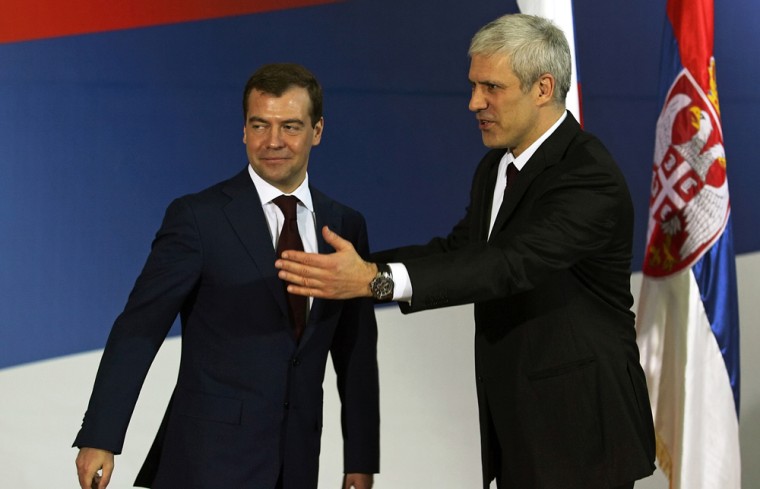The man expected to win Russia's upcoming presidential election traveled to Serbia for a visit that will underscore Moscow's close ties with Belgrade and Serbia's support for its rejection of Kosovo's independence.
Dmitry Medvedev, in his current capacity as a Russian deputy prime minister, has focused on domestic economic and social issues, and his trip to Belgrade on Monday is his first major foreign-policy initiative.
As the crisis over Kosovo deepened in 2007, Russia emerged as Serbia's principal ally in its efforts to hold on to the breakaway province.
In contrast to the U.S. and many EU nations that quickly recognized Kosovo's declaration of independence last week, Moscow declared the move illegal and warned that it will block efforts to get the new nation to join the United Nations or other international organizations.
Russian President Vladimir Putin has said that Kosovo's declaration represented "a terrifying precedent," and warned the West that the decision would "come back to knock them on the head."
Economic ties booming
Serbia and Russia have grown increasingly close in recent years, and economic ties are booming.
In January, the Kremlin signed two multibillion dollar agreements with Serbia that Russian officials said would make the poor Balkan nation an important hub for the distribution of Russian gas.
The deal includes an agreement to route one leg of the planned South Stream gas pipeline through Serbia en route to Western Europe, and to build a major gas storage facility in Serbia.
Diplomatic officials in Belgrade said Medvedev — who is almost certain to win the presidential election March 2 — was expected to focus on economic issues during his visit to Belgrade, since he also comes in a second capacity, as chairman of Gazprom.
Still, his statements in Serbia will be watched closely for indications of Russia's foreign policy intentions after Putin steps down in May.
Many observers believe that Medvedev as president would essentially carry out the policy of Putin, who is expected to retain substantial influence by becoming prime minister. Medvedev's position on Kosovo could show whether he intends to chart a foreign-policy course of his own.
But any significant deviation on Kosovo would be unlikely. Not only have Putin and the Russian Foreign Ministry harshly criticized Kosovo's independence, but the powerful Russian Orthodox Church also has denounced it, fearing destruction of the monasteries and churches that are seen as the cradle of Serbian Orthodoxy.
Alternative to EU, NATO?
Some Serb ultra-nationalists close to Prime Minister Vojislav Kostunica who oppose gradual integration into the European Union and NATO view Russia as a possible alternative. Some hard-liners have even proposed that Moscow establish military bases on Serbian territory.
But there has been no sign that Russia would be interested in such a move.
Still, the suggestions have been ridiculed by pro-Western political leaders.
Nenad Canak, leader of the reformist Social-Democratic League of Vojvodina, accused Kostunica of trying to turn Serbia into a "Russian Gulag" — referring to the system of slave labor camps established under former Soviet dictator Joseph Stalin.
"Today we must choose between Europe and Asia, between democracy and totalitarianism," Canak said Sunday.
Analysts warned that Serbia risks becoming a proxy in the struggle for regional influence between Russia, the European Union and the U.S.
"The worst fate that can befall a small nation is to find itself stuck between several large and competing powers," said Zorana Dragisic, a military and political analyst.
